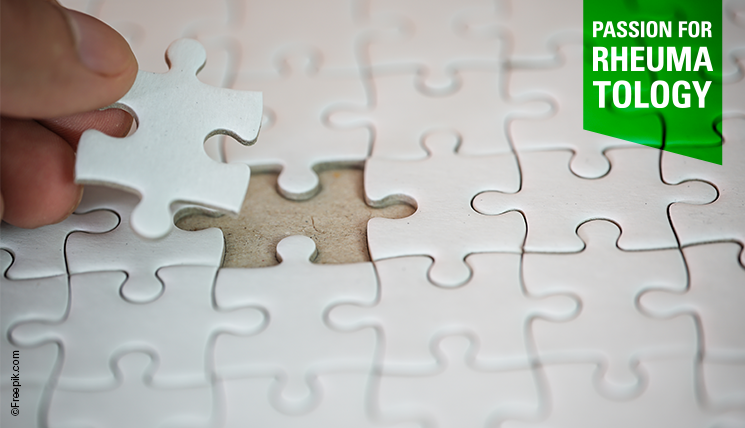With passion for rheumatology!
Systemic autoimmune rheumatic diseases encompass a wide range of different inflammatory joint, tissue and vascular diseases, such as rheumatoid arthritis, systemic lupus erythematosus and systemic sclerosis. They are diagnosed on the clinical history, imaging techniques, and serological tests. Antibody detection is a useful diagnostic tool and can provide essential information for differential diagnostics. However, it is not always possible to detect autoantibodies, as not all target antigens have been discovered yet and detection systems are not yet available for every autoantibody.
EUROIMMUN contributes actively to research in order to close this “seronegative gap”. In 2012, EUROIMMUN started the UFO – for “unknown fluorescent object” – project in order to identify unknown immunological biomarkers. Since then, a large number of new target antigens was discovered and many scientific publications and cooperation followed. Nuclear vasolin-containing protein-like (NVL) is one of the success stories.
Using EUROIMMUN’s strategy for the identification of target antigens1, 164 serum samples were analysed which had been positive in the indirect immunofluorescence assay (IFA) on human epithelial cells (HEp-2 cells) but did not react with any of the 23 established nuclear autoantigens tested with the confirmation assay. 14 antigens were identified, nine of which had not previously been described as ANA target antigens – among them, NVL.2 In order to investigate the clinical relevance of these newly discovered antigens, prototype line blots or cell-based assays (CBA) were developed. In cooperation with the Charité – Universitätsmedizin Berlin, the clinical association of the new marker NVL was analysed in a panel of 693 patients with systemic autoimmune rheumatic diseases and 150 healthy controls. In four patients, anti-NVL antibodies were detected by means of a line blot with recombinant purified antigen. All four patients had been previously diagnosed with systemic sclerosis. The full study “Identification of nuclear valosin-containing-protein-like as a target of anti-nuclear autoantibodies in systemic sclerosis” has recently been published in Frontiers in Medicine.3
Today, the autoantigen NVL is available exclusively* on the EUROLINE Systemic Sclerosis Profile 2, together with 12 established antigens associated with systemic sclerosis.

The EUROLINE is a time-saving multiplex test for monospecific autoantibody detection and helps to improve diagnostics of systemic sclerosis. It enables classification between the limited and diffuse form of systemic sclerosis and of overlap syndromes. There are different automation solutions available for processing and evaluation. Owing to the standardised incubation protocol, the test can be conveniently combined with other EUROLINEs.
1 Scharf M, et al. A spectrum of neural autoantigens, newly identified by histoimmunoprecipitation, mass spectrometry and recombinant cell-based indirect immunofluorescence. Frontiers Immunol 9:1447 (2018).
2 Zeng Z. Identification of nine unknown nuclear antigens as autoantibody targets in systemic autoimmune diseases. 14. Dresden Symposium on Autoantibodies, Dresden, Germany (2019).
* Patent applications pending (EP4063864 A2, CA3151417 AA, CN115128275 A, US2022317121 AA and TW202305362 A)
Find out more about our portfolio for rheumatological diagnostics here. Get an overview of our range of different methods and the corresponding automation systems. Together we will find the right solutions for your laboratory!

